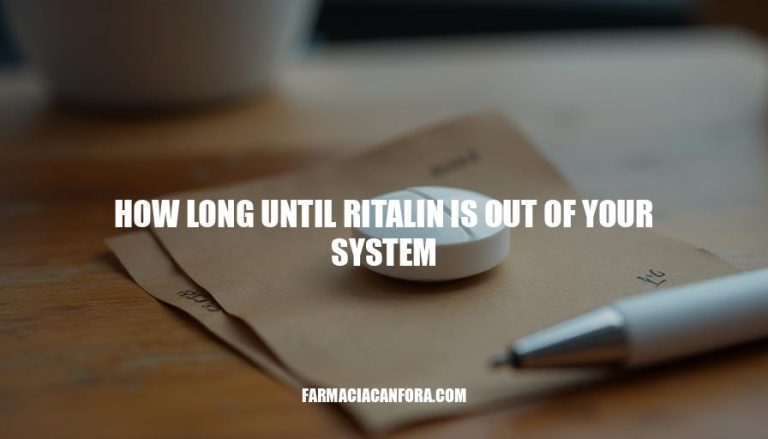


Ritalin is a medication used to treat ADHD and narcolepsy. It helps people focus and pay attention by changing chemicals in the brain. But it’s also important to know how long Ritalin stays in your system.
This matters because you need to watch out for side effects, make sure you’re taking it safely, and avoid taking too much. If you don’t know how long it lasts, you might accidentally take too much or experience withdrawal symptoms. Knowing this information can also help if you have a drug test coming up.
Some people may experience side effects like insomnia, a fast heart rate, or anxiety, which could be serious.
Ritalin, also known as methylphenidate, is a central nervous system stimulant used primarily to treat Attention Deficit Hyperactivity Disorder (ADHD) and narcolepsy.
Absorption: Ritalin is rapidly absorbed from the gastrointestinal tract, with peak plasma concentrations typically occurring within 1 to 3 hours after oral administration. The bioavailability of Ritalin varies widely among individuals, ranging from 11% to 53%, due to presystemic metabolism.
Metabolism: Once absorbed, Ritalin is metabolized primarily in the liver by the enzyme carboxylesterase CES1A1. The primary metabolic pathway involves de-esterification, converting Ritalin into ritalinic acid, an inactive metabolite.
This process can vary among individuals, affecting the duration of Ritalin’s activity.
Distribution: After metabolism, Ritalin’s active components are distributed throughout the body, including the brain, where they exert their therapeutic effects by blocking the reuptake of norepinephrine and dopamine into presynaptic neurons.
Elimination: Ritalin is eliminated from the body primarily through urine, with about 90% of the drug excreted in this form. The elimination half-life of Ritalin is approximately 2 to 3 hours for the immediate-release formulation and around 8 hours for the extended-release formulation.
Half-life: The half-life of a drug is the time it takes for the concentration of the drug in the body to be reduced by half. For Ritalin, this means that after 2 to 3 hours (for immediate-release) or 8 hours (for extended-release), half of the drug has been metabolized and eliminated from the body.
Time until Ritalin is out of your system: Given the half-life, it typically takes about 5 to 6 half-lives for a drug to be considered eliminated from the body.
Therefore, for immediate-release Ritalin, it would take approximately 10 to 12 hours, and for extended-release Ritalin, it would take around 40 to 48 hours for the drug to be mostly eliminated.
Factors affecting how long Ritalin (methylphenidate) stays in your system include:
Age: Younger individuals generally metabolize Ritalin faster than older individuals.
Liver function: Efficient liver function is crucial for metabolizing Ritalin. Impaired liver function can slow down the process.
Dosage: Higher doses of Ritalin take longer to be eliminated from the body.
Individual metabolism rates: Metabolic rates vary from person to person, affecting how quickly Ritalin is processed and eliminated.
Body mass: Individuals with higher body mass may metabolize Ritalin differently.
Genetic factors: Variations in metabolic enzymes, particularly cytochrome P450, can influence how quickly Ritalin is metabolized.
Concurrent medications: Other medications or substances can either slow down or speed up the elimination of Ritalin.
Administration route: Immediate-release formulations clear faster than extended-release formulations.
When estimating the elimination time for Ritalin, consider these factors to get a more accurate timeline. Keep in mind that individual responses can vary widely.
Ritalin, a medication used to treat ADHD and narcolepsy, stays in the system for varying lengths of time depending on several factors.
The half-life of Ritalin is approximately 2-3 hours for immediate-release formulations and 8 hours for extended-release formulations. It typically takes around 10-12 hours for immediate-release Ritalin and 40-48 hours for extended-release Ritalin to be mostly eliminated from the body.
Several factors can affect how long Ritalin stays in your system, including:
It’s essential to consult healthcare professionals for personalized information and advice on Ritalin use, dosing, and potential interactions with other substances. Understanding how long a medication stays in your system is vital for safe and effective treatment, as well as avoiding side effects and withdrawal symptoms.
In conclusion, knowing the elimination time of Ritalin can help individuals manage their medication regimen effectively and make informed decisions about their health. However, it’s essential to rely on healthcare professionals for accurate and personalized information, as individual factors can significantly impact drug elimination times.